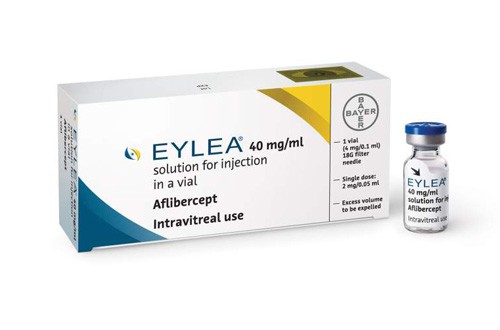
Bayer’s eye disease therapy Eylea has been cleared for a new macular oedema indication in the EU, stepping up competition against rival therapy Lucentis from Roche.
The European Commission has approved Eylea (aflibercept) for the treatment of patients with macular oedema secondary to retinal vein occlusion. Previously, the label for the drug was limited to macular oedema secondary to central retinal vein occlusion (CRVO) in adults.
Eylea is being co-developed by Bayer and Regeneron, with Bayer holding exclusive marketing rights to the product outside the US.
The new approval was supported by the phase III VIBRANT trial which showed Eylea was associated with significant improvements in best-corrected visual acuity compared to laser treatment in patients with macular oedema following branch retinal vein occlusion (BRVO), while more than 50% of patients in the Eylea arm gained at least three lines of vision.
BRVO is a common cause of visual impairment in the elderly and is around three times more common than CRVO, affected some 14m people worldwide.
Eylea is one of Bayer’s fastest-growing products, hitting €759m in sales last year – well above Bayer’s €700m target – with market share of almost 50% in some countries including Japan and Australia, 41% in Switzerland and upwards of 35% in Germany, the UK and France. The drug achieved sales of €333m in 2013m its first full year on the market.
Bayer and Regeneron are still playing catch-up with Lucentis (ranibizumab) however as Roche’s has a lead in the diabetic macular oedema market (DME), which represents a large additional patient population. Eylea was approved to treat DME in the US last July and in Europe the following month, while Lucentis has had that indication on its label since 2012.
Bayer healthcare chief executive Olivier Brandicourt – who will leave the company to take the top job at Sanofi in April – said during the company’s fourth-quarter results call yesterday that gaining momentum in diabetic patients would be the key to reaching 50% market shares in Europe.
Given the greater level of competition, Roche chief operating officer Dan O’Day noted during the firm’s annual results call last month that the company is “much more conservative” about Lucentis’ growth this year – with the potential for flat or even a modest decline in sales. Expanding use in diabetics could however help the product return to growth in 2016, he added.
Earlier this month, a head-to-head trial in DME of Eylea, Lucentis and Roche’s Avastin (bevacizumab) – published in the New England Journal of Medicine – concluded that while there was little difference between the three drugs overall, Bayer’s drug performed the best at improving vision scores in patients with worse levels of visual acuity.
Revenues up but profits down
Overall, Bayer posted a 7% increase in fourth-quarter sales to €11bn, although earnings before interest and taxes (EBIT) fell 14% to €561m on increased R&D and selling costs. For the full year, revenues were up 5% to €42.2bn.
The company’s five most recently launched drugs – Eylea; anticoagulant Xarelto (rivaroxaban); cancer drugs Stivarga (regorafenib) and Xofigo (radium Ra 223 dichloride); and pulmonary hypertension treatment Adempas (riociguat) – collectively added €2.9n in sales for the full year, ahead of forecasts.




